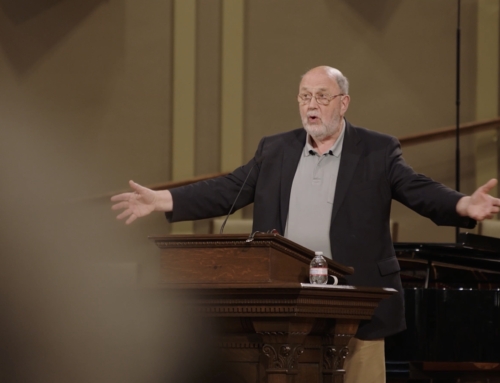For many, the Psalter shapes a regular rhythm of daily Bible reading, prayer, or theological reflection. Others may study the linguistic and literary structures of Hebrew poetry or search the various types of psalms for common themes.
Some may find studying the psalms as a bit of a mystery. Recent scholarship lends clarity by suggesting the ‘canonical Psalter’ was arranged purposefully as a unified whole marked by editorial arrangement and intent’.* Three of these structural indicators include:
- The division of the Psalter into give books marked by concluding doxologies.
- Book 1: Pss. 1-41
- Book 2: Pss. 42-72
- Book 3: Pss. 73-89
- Book 4: Pss. 90-106
- Book 5: Pss. 107-150
- The placement of Pss. 1 and 146-150 as introduction and conclusion to the unified five-book collection.
- The placement of other significant psalms (some ‘royal’ and ‘wisdom’ psalms) at strategic junctures of the canonical collection.**
Psalms studies can take many approaches, including a focus on the messianic theme of eschatological hope throughout the collection.*** In our latest course, ‘Selections from the Psalms’, Prof. N.T. Wright will illuminate some of these Jesus-shaped themes from the very prayer book that shaped some of his own prayers. You will learn how the early church gave worshipful voice to God—thanking him specifically for what he’d done in Jesus. You will also be encouraged by how the psalms might inform your own praise, petitions, and prayers to God.
Tools for Digging Deeper
We think you will enjoy digging deeper into the Psalms! Yet, it can be easy to get distracted with learning online or to get side-tracked before having the chance to complete the course.
To help enrich your understanding of the texts and to facilitate more focused study, we include Practice Exercises with every course that follow every lecture.
Here are three ways you might utilise the course materials and resources:
- Practice Exercises to Absorb what you’ve learned:
- Practice Exercises to Reflect upon what you’ve learned:
- Practice Exercises to Practice what you’ve learned:
Following each of Prof. Wright’s 18 lectures, you will find a PDF file that you may download or print. Each Practice Exercise slide contains 8-10 questions to guide reflection. You may share your reflections with others enrolled in the course in Udemy’s Q&A forum.
What Students Think of Practice Exercises
One of our N.T. Wright Online students, Buddy Coffey,**** shared his feedback:
Wow! That slide is perfection on paper!
Here’s what I liked:
I can see all the topics at once, which gives connectedness to the discussion time. That means I can discern the overall theme at the beginning of the exercises, rather than have to deduce it as I would have to do if going through the questions sequentially.
It emphasizes that I don’t have to address the topics in any order, or even address them all. There’s no, ‘Oh, I’ll skip this one and come back to it later’. Rather, I latch on to what grabs my attention first.
The questions themselves have been posed to appeal to people no matter where they’re at in their studies or walk with Christ. The questions can be entered into from multiple levels.
For small groups that are meeting in person, I would recommend showing the Practice Exercises slides on screen and letting them be the focal point in the discussions.
For the small group leader, or for individual study, Buddy shares two sets of teaching triads that are useful for learning and teaching:
- Engage the reader/listener – bring them into the process. Get the ‘motion picture’ rolling in their minds. Ask yourself, ‘What are they going to remember tomorrow or next week’?
- Respect the reader/listener – respect where they are in their walk with God, respect the time or lack of time they may have to devote to the teaching, respect their backgrounds which may be different from yours.
- Do the above with humility. Teaching is a supportive role*. As such, the focus is never on the teacher but on (1) the material to be taught and (2) the participants who are doing the learning.
- Another teaching point: there is no Greek word for ‘teach’ in the New Testament. Wherever we see ‘teach’ (e.g., Jesus sat down and began to teach”), the Greek uses the causative form of the verb, ‘to learn’. That is, teaching is, ‘causing to learn’. Thus, “Jesus sat down and began to ‘cause them to learn.’
Questions the Psalms Ask
The psalms point us towards worship in song or personal piety and give voice and expression to concrete situations in ‘real life’. The psalmist asks questions such as:
- Why is the world this way?
- How do I pray for someone who feels the closure of death?
- What expressions can I use to praise the Lord and respond to the call to worship?
- Where can I turn when everything seems hopeless?
- Why does it seem like the wicked go unpunished?
- What words can I use to give thanks to God?
- How can I celebrate with joy for all that God has done?
This course explores 18 psalms Prof. Wright selected for deeper study and theological reflection. Each lecture will examine various types and themes within the Psalter and probe the ways in which Israel viewed God, themselves, and the world. You will be encouraged and inspired by Israel’s worship and praise of God as Creator. You will also come to sense how these ancient songs and prayers shaped the lives of God’s people to sense the call of the Davidic kingdom that continues to resound for followers of Jesus today.
*Gerald H. Wilson, ‘The Structure of the Psalter’, in Interpreting the Psalms: Issues and Approaches, David Firth and Philip S. Johnson, eds., (InterVarsity Press, Downers Grove, IL, 2005), 229.
**Ibid., pp.229-31.
***David M. Howard, Jr., ‘The Psalms and Current Study’, in Interpreting the Psalms: Issues and Approaches, David Firth and Philip S. Johnson, eds., (InterVarsity Press, Downers Grove, IL, 2005), 27.
****Dr. Edgar L. (Buddy) Coffey received his Ph.D. from Virginia Tech in 1976 and has been teaching and writing in one way or another ever since. At about the same time, he developed a love of scripture when he heard a Christian musical based on the life of Paul called ‘The Apostle’, and that love continues to this day. Buddy fulfills his Christian vocation through lay ministry at Mountain Christian Church in Joppa, Maryland, where he serves regularly in the worship band and in men’s and groups ministries. As his schedule permits, he also writes for the Christian web site SaltRadioMinistries.com.
Jennifer Loop
Latest posts by Jennifer Loop (see all)
- Why You Need Lent: Two Perspectives - February 22, 2023
- How (Not) To Understand a Parable - October 20, 2022
- What People are Saying About ‘Ethnicity, Justice and the People of God’ - February 10, 2022







